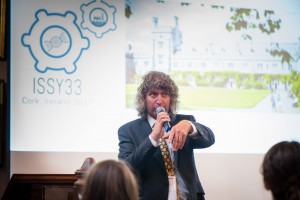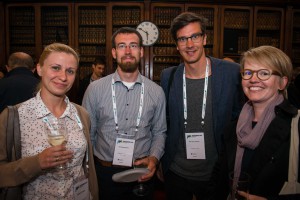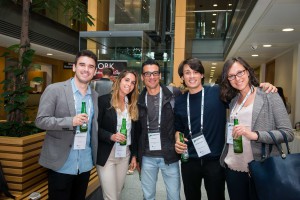The 33rd International Specialised Symposium on Yeasts (ISSY33) was held at University College, Cork on the 26th – 29th June 2017. Overall, the conference was an inspiring and fascinating selection of scientific research, and a great mix of industry and academic researchers from all over the world and at all stages of their careers. Nearly 300 delegates from around the world attended, providing excellent opportunities for networking and discussion.

CHASSY coordinator, John Morrissey, chaired the conference and was assisted by session chairs from many of the CHASSY partners including Eckhard Boles (Goethe University, Frankfurt); Jens Nielsen and Verena Siewers (Chalmers University of Technology, Gothenburg); Jean-Marc Daran (Technical University Delft); and researchers from INRA, Montpellier. Harald Heider from Evolva also attended.

One of the main themes covered at ISSY33 was the development of yeast cell factories for production of valuable products. Yeast cell factories have been used to produce bioethanol for many years, but in more recent times, the application of strain engineering for production of higher value molecules, such as those targeted in CHASSY, has come to the fore. There have been some high-profile success stories, such as the production of Artemisinin in yeast (Paddon and Keasling, 2014). ISSY33 showcased some of the latest research in the field. In the closing keynote, Christina Smolke presented some of her inspiring research on development of yeast for bio-based production of medicines.
From a societal viewpoint, the development of yeast strains to produce molecules such as fatty acids, fatty alcohols, organic acids and chemical precursors, is no less important than medicines. For sustainability reasons, there is an imperative to replace oil (both fossil and plant-derived) with biomass, and yeast is to the vanguard of this emerging bio-based sector. There was a comprehensive set of presentations from senior and junior researchers on some of the latest developments for engineering yeast to generate high value cell factories.
The third ISSY33 theme addressed the importance of stress responses and strain robustness. There is tremendous overlap between the stresses encountered by yeasts during alcoholic or industrial fermentation and the inclusion of this theme facilitated knowledge transfer across these sectors.

Javier Varela, a research assistant in UCC working on CHASSY received great praise for his talk on the expansion of sugar transporters in the genome of the industrial yeast Kluyveromyces marxianus. Researchers from Evolva, INRA, and Delft also gave talks on a range of topics related to metabolic engineering, industrial stress, and methods of strain optimisation. If you’re interested in the research of the ISSY33 presenters, take a look at the FEMS Yeast Research Special Virtual Issue.
Source
CHASSY, press release, 2017-06.
Supplier
Chalmers University of Technology
Evolva Holding AG
French National Institute for Agricultural Research (INRA)
Goethe-Universität Frankfurt/Main
University of Technology, Delft (NL)
Share
Renewable Carbon News – Daily Newsletter
Subscribe to our daily email newsletter – the world's leading newsletter on renewable materials and chemicals










